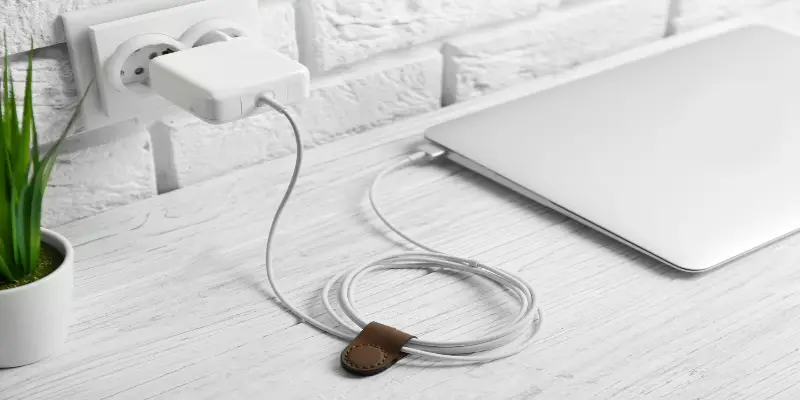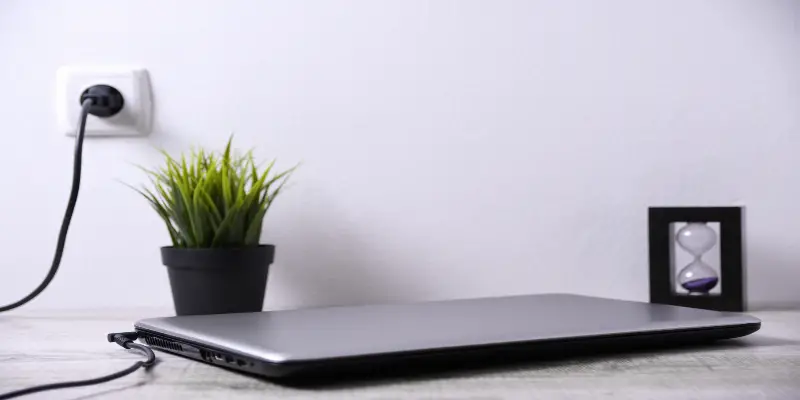Disclaimer: This post may contain affiliate links, meaning we get a small commission if you make a purchase through our links, at no cost to you. For more information, please visit our Disclaimer Page.
You’ve probably heard conflicting opinions on whether or not to leave your laptop plugged in or use the battery. Some say that it’s better to let your laptop run on the battery so you don’t run the battery down, while others say it’s better to leave it plugged in so you can get as much use out of it as possible. Here’s what you need to know:
It doesn’t matter whether you leave your laptop plugged in or you run it on battery. It won’t overcharge. Yet, you need to keep an eye on the temperature. A lithium-ion battery doesn’t want heat as it degrades its battery life.
Table of Contents
Can I use my laptop while charging it even when it is fully charged?
You can use your laptop while charging it. Even if the battery is fully charged, you can use it too. However, it depends on how long you’re using your laptop. If you’re using it for a short time, you don’t need to worry about its battery. But if you’re using your laptop as a replacement for a desktop, that’s another story.
The longer time you use your laptop can affect the performance of its battery. Longer usage of your device leads to the production of excessive heat. When the laptop produces a large amount of heat, the battery suffers from it. This is particular for Lithium-ion batteries, which new models of laptops use today.
According to research, the temperature that you need to avoid is 113F or 45C. The performance of the battery decreases when your battery hits that temperature. And even worse when it gets higher.
The research showed that at 113F the performance of the battery at its first 200 cycles decreased by 6.7%. Its degradation level is more than double compared to the battery at 77F in the same cycle because the battery at 77F only had 3.3% degradation. If your battery gets exposed to high temperatures more often, there’s a bigger chance that its lifespan decreases faster than it should be.
This is the reason why I said that it’s okay to use your laptop while you’re charging it. It’s not that dangerous because it won’t catch fire. But it degrades the battery life, which is not ideal and practical.
If you need to use your laptop for a longer period, you must keep it well-ventilated. You can use an external fan to maintain the temperature of your laptop especially when you’re playing games. But if you can turn your laptop off for a few hours before using it again, that’s the best option.
You can also make your battery’s life cycle longer if you keep it below the elevated temperature. Lithium-ion batteries or LiB’s elevated temperature starts at 86F.
What happens when we use a laptop while charging?
Even though you’re using your laptop with the battery while charging it, nothing outrageous will happen on your laptop. It means that it won’t explode even if you use it for a long period. So, you don’t need to worry about it. Nowadays, many laptops use lithium batteries, which are safe to use.
Lithium battery is not prone to overcharging because it has a control system that prevents it from happening. When it reaches its full charge capacity, it stops charging. With the mechanism of the internal circuit inside the battery, overcharging is impossible. You can charge a lithium-ion battery up to 500 times and no problem will happen.
You’re maybe wondering right now if it’s okay to keep using your laptop even though its battery is not fully discharged. Well, it’s okay to use as long as your laptop comes with a lithium-ion battery. The lithium-ion battery has no memory effect, which means that it won’t remember its previous charge capacity. It also means that you can recharge it at any time.
A lithium-ion battery lasts longer if you don’t leave it fully discharged, which is the complete opposite of a nickel battery. When using it for the first time, you don’t need to fully charge a lithium-ion battery to lengthen its battery life. Although, some experts require you to charge it in full for calibration.
Battery calibration helps your laptop to get an accurate estimate of the power percentage that your battery has. When a battery is not calibrated, your laptop may think that your battery has a different capacity level, which is different from the actual. For example, a non-calibrated battery may show on your laptop a 70% capacity level but in reality, it’s only 50%. Calibrating your battery once a month is fine.
Yet, you can skip the calibration if you own a new model of laptop as new models can self-calibrate.
Is it better to leave the laptop plugged in or run on battery?
You can either leave your laptop plugged in or run it on battery without encountering any problem. Yes, your battery won’t explode even if it’s plugged in all day as long as it’s a lithium-ion battery. As I said earlier, a lithium-ion battery stops charging when it reaches 100%. It means that it won’t overcharge and the probability of explosion is minimal.
And as I also mentioned earlier, a lithium-ion battery hates heat because it decreases its battery life. So, before it gets hot, you need to stop using your laptop especially if you’re not using a USB fan to cool it. If you’re using an older model of laptop, you’re lucky. You can remove the battery and leave it plugged in like what you’ll do on a desktop.
If you’re using a new laptop model where you can’t remove the battery, it’s time to know how you can improve the battery life.
According to Battery University, it’s better not to fully charge a battery as it can affect the battery life. Based on the information provided by Battery University, it takes a lot of energy to fill up the last 3% of the battery before it reaches a full charge. With the large amount of energy needed to move the charges, the battery suffers from it, which decreases its life span.
The ideal battery level is below 100%. With the low battery level, it can improve the discharge cycle of your battery. It means that the battery’s lifespan can extend from several months to a year.
The Battery University showed that an 85% to 90% charged battery has an improvement in its discharge cycle. The improvement is between 300 to 1000 extra recharges. It showed that the battery life can extend from six months up to one year. On the other hand, a battery with a 70% to 75% charge can almost have a discharge cycle of up to four times its normal cycle.
Another factor that affects the battery life is the battery voltage. A battery charged longer can keep the high voltage for a longer period compared to a battery with less charge. A battery with a charge level of 4.2 V/cell has a 100% battery level. On the other hand, a battery with a charge level of 4.10 V/cell only has an 85% to 90% battery level.
Although the battery with the higher voltage has a higher battery level, its discharge cycle is only between 300 to 500 cycles. On the other hand, the battery with a charge level of4.10 V/cell has a discharge cycle between 600 to 1,000 cycles. It means that the lower voltage can last longer than the battery with a 4.2 V/cell.
You can also preserve the battery by not using it and placing it in storage. But you need to charge it up to 50% before you keep it. Preserving the battery can also help in extending your laptop’s battery life. If your laptop has a removable battery, removing the battery is fine.
Conclusion
It’s safe to use your laptop even if you want to plug it all day as long as it doesn’t get hot. A laptop battery works fine at a normal temperature. Using a USB fan or a typical electric fan can do the cooling work.


